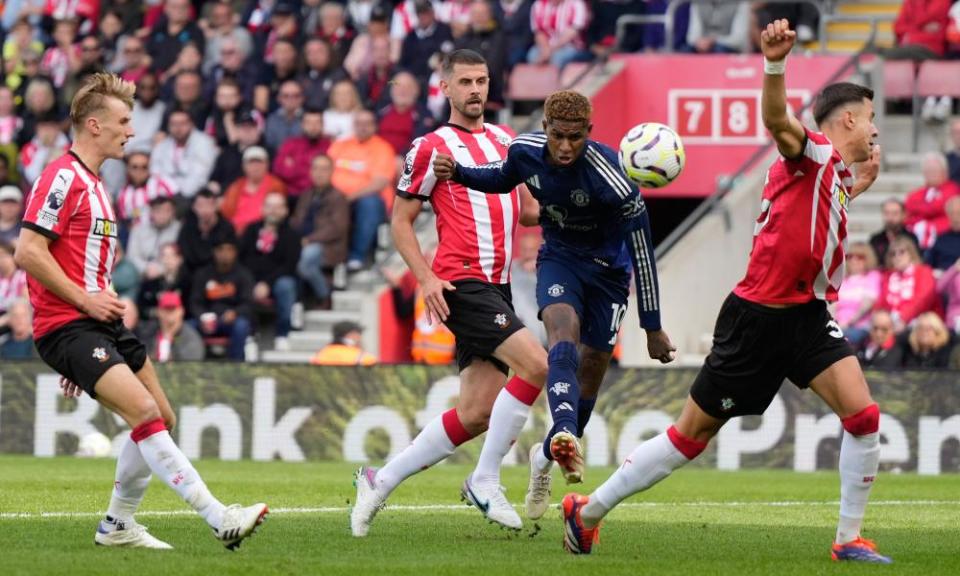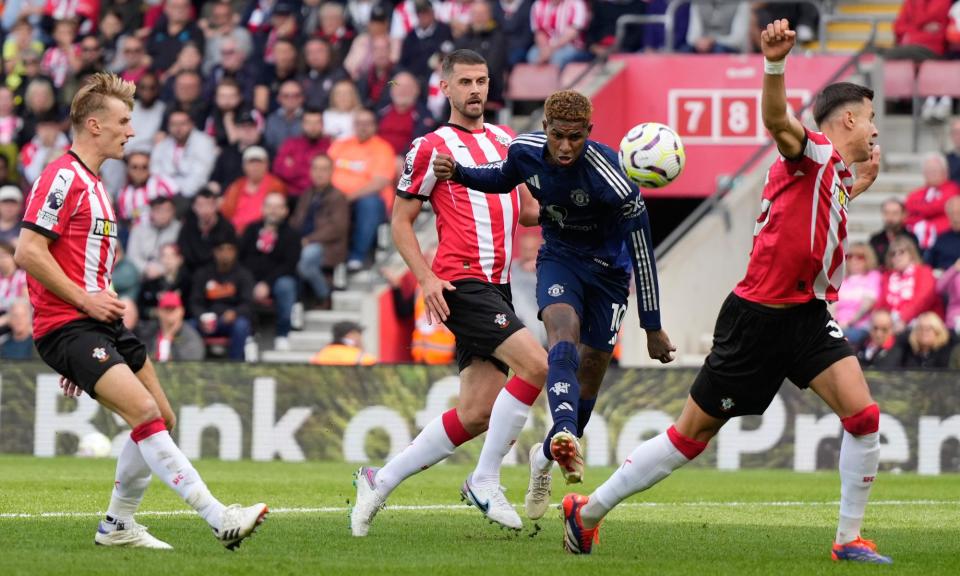Happy Rashford is a happy Manchester United as winger ends goal drought
The sun was just trying to break through as Manchester United took their curtain call here: a weak and hazy sunlight, an autumn-adjacent sunlight, sunlight if it had been taught how to press by Ole Gunnar Solskjær. But sunlight all the same. And as perfunctorily routine as this win seemed in retrospect, days like these are actually pretty rare for United, a club where the roof always seems to be leaking, even when it isn’t raining.
This was – by way of illustration – only their second away win in the Premier League since February, their biggest win on the road since November, their biggest league win against Southampton since 2001, the year they left the Dell. And yes, getting to that stage required half an hour of pure inertia, a saved penalty and a pretty complete implosion from a home side that failed to register a single shot in the last hour of play. But finally, United had carved themselves out a little breathing space.
Related: Erik ten Hag hopes Rashford will be like ‘ketchup bottle’ and keep goals flowing
With Southampton offering nothing beyond a treadmill of fouls, it was possible to see Erik ten Hag’s team as he himself appears to see it all the time: calm, controlled, almost serene. Kobbie Mainoo could run things in midfield. Marcus Rashford and Amad Diallo had clean green grass to run into. Alejandro Garnacho buzzed around like a man slightly too good for this game. Manuel Ugarte, the new anchorman signed from Paris, looks a proper player.
How had we reached this point, really a state of mind as much as a function of tactics? The scoreline explains a little, but not everything. Plenty of recent United teams have been two goals up – think Newcastle at home last season, Galatasaray away, pretty much every game of their winning FA Cup run – and made the experience of leading look and feel like invasive dental surgery.
But here there was a difference. And perhaps it feels wholly simplistic to reduce the output and success of one of the world’s biggest and most complex football clubs to the fate of one nippy 26-year‑old winger, but we’re going to do it anyway. You can throw your strategic review and your cultural reset and your new recruitment team and your rebooted transfer strategy in the bin. Write this down on a piece of paper: a happy Marcus Rashford is a happy Manchester United.
Just watch his teammates celebrating with him as he scores his first goal for United in more than six months, almost queueing up to celebrate with him, to share and amplify their joy. Just watch the United bench, which somehow comes to life with a new insurgent energy as Rashford twists inside from the left and skims the ball low from a distance and it nestles in the back of Aaron Ramsdale’s net. Just watch Rashford himself, smiling like a man only just remembering to smile again, a smile as contagious as Covid.
Those six months, of course, incorporated some injuries at the tail end of last season, a long summer break with no tournament, a full pre-season and just 12 actual games of football. Still. As the missed chances began to pile up, as first England and then United started to reorganise around him, something about this began to feel terminal, to the point where it was possible to wonder if Rashford might ever be truly happy – in a footballing sense – again.
Related: Garnacho seals Manchester United win at Southampton after Onana penalty save
And certain players, in conjunction with certain teams, do just seem to inspire these kinds of feelings. At United perhaps only Bruno Fernandes comes close in terms of Rashford’s ability to set the emotional weather of the place. To the point where – because of the sheer volume of emotion invested in him, be it for historical or cultural or even ideological reasons – his successes and failures somehow feel emblematic of the whole, in the way those of Christian Eriksen or Diogo Dalot do not. Some players just mean more.
You will point out – with a certain validity – that one goal in a 3-0 win against Southampton does not signify very much on its own. That Rashford’s pressing is still suspect, his place still under threat, his career scoring record still too inconsistent. And of course, the data backs you up on all of this. But when we talk about the way a player can inspire feelings, really we’re going beyond what can be measurably accomplished on a field in terms of goals and assists.
Note, too, that we’re not talking about trophies or wins or even Premier League points here. To an accountant or an analyst, the difference between no goals in the last 189 days and one goal in the last 189 days is statistically insignificant, white noise, a rounding error. But the difference is this: yesterday it was raining and today it’s sunny. For some players, it really is that simple.


